By Hartwig Berger
Training program in Berlin, for the 3d YESclima team Berlin, March 2020
The EUKI project YESclima offers practical training for students on energy audits in buildings. A total of 22 young people, selected on a gender-balanced basis are carrying out energy audits in schools in small towns in the province of Cadiz and in towns near Athens, since autumn 2018. They are elaborating proposals on how these schools can be made more climate-friendly by activities and refurbishment. Two of the teams have already paparticipated in training programmes in Berlin. The third team consisted of 3 students from Athens and 3 students from the province of Cádiz visited Berlin in March 2020 for their training course some days before the lockdown. All were students or had just finished studies in industrial (1), mechanical (2) and environmental engineering (1) and in architecture (2). The Cádiz group have started their activities on 1st January 2020, the Greek group on 15th February.
The training program was planned for two weeks, including two parts:
-
I. projects and activities of energy saving and climate protection in Berlin and its surroundings, 7 workdays
-
II. A course in empowerment, employability and entrepreneurship, 3 workdays
After one week, due to the corona crisis, the participants had to return to their homes, so that the first part of the course could not be totally completed. But the second part of the course took place in teleconferences with the participants.Due to corona virus, the project work is now taking place online.
I. Projects and activities to save energy
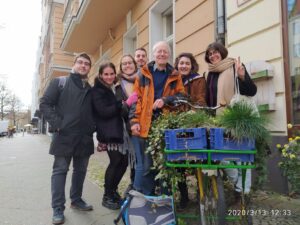 The study-group in Berlin. Photo S. Stragies
The study-group in Berlin. Photo S. Stragies
The study-group was assisted by Hartwig Berger, leader, and Sebastian Stragies, assistant of the program.
The study program consisted of
1. The Urgency of Climate protection
We agreed on the emergency of the global climate crisis and the necessity to act quickly and profoundly. Mutual information and discussion was concentrated on the tipping points in climate change, with far-reaching consequences accelerating the global warming: the braking of the arctic ice and the Greenland shield, the danger of change in the oceanic streams with far-reaching climatic consequences, the melting permafrost in the subpolar region with growing methane- and CO2-emissions in consequence, the change of the jet stream, the methane emissions to be expected from deep ocean grounds. We took into account realistic calculations of the maximum budget for carbon emissions, which must not be exceeded for limiting the global warming to 1,5 resp. 2 degrees in relation to preindustrial time.
2. The European Green Deal (EGD)
The European Green Deal, presented by the European Commission in December 2019, was discussed in its different parts, as well as the targets, which have to be accomplished by the National Energy and Climate Plans (NECP) and corresponding activities in all member states.
In discussing different measures elaborated by the EGD our main focus was upon the consequences of the demand of a high quantity of qualified experts in many different fields and professions to realize the targets, the measures and the activities in climate protection intended by the EGD. In the next years qualified personnel in the sectors of renewable energies, energy saving and energy efficiency will be required on a large scale. In this context, we presented and discussed the results of the ZEW-Klima study commissioned by EUKI, elaborated in the province of Cádiz and the metropolitan region of Athens, just the regions of our team.
3. Energy Autonomy on Regional Level
As an example of successful efforts to make regions autonomous in energy, we discussed the activities of a regional district in Germany, the “Rhein-Hunsrück Kreis” (RHK) in the Bundesland Rheinland-Pfalz. In several aspects the district is similar to the the intercommunal association “La Janda” (LJ), the “work-district” of our project in Spain: Both are composed by small towns and villages, highly similar in extension and in its population size and characterized by a formerly rural economy which has changed (RHK) or which has to be changed (LJ) to small and medium-sized enterprises in the industrial and service sector.
Within 20 years, the German district has achieved the full supply of electricity provided by wind-craft and photovoltaic, exporting at the same time electricity on a large scale. The region presents successful efforts to save energy in the public sector, in companies and in households. A large proportion of the heating systems has been converted to wood chips harvested in the region itself and mainly from waste wood in gardening, parks etc. The region has benefited significantly from this development in its economy, its public revenues, in creating new and innovative enterprises and in offering more opportunities for qualified work in the sector of energy transition and a high employment rate in general.
We discussed the feasibility of regional energy autonomy in the team’s home districts. Decisive for the success in RHK were
-
Strong impulses given by inhabitants engaged for ecology and peace.
-
Cooperative and sometimes directly engaged local politicians and administration
-
Investment funds formed by inhabitants of the middle class and small enterprises as actors in the necessary economic and financial activities
-
A relatively fair distribution of agricultural land, with a significant proportion of communal property; so that the towns, villages and small land owners receive the tenant prices from the energy-use of land
Not all of these favourable conditions do exist in the “reference regions” of Southern Europe. On the other hand, the conditions for the use of solar energy are significantly more favourable, because of the existing solar irradiation.
4. Green roofs and plants for cooling effects, combined with solar energy
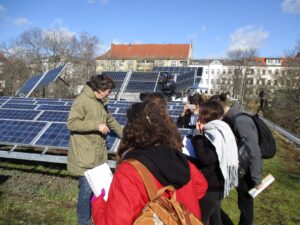 On a green roof of UFA-Fabrik with solar panels moved by the sun. Photos H. Berger
On a green roof of UFA-Fabrik with solar panels moved by the sun. Photos H. Berger
Combined with lectures concerning the energetic and cooling potential of evaporation and the technique of adiabatic cooling, we visited two different buildings in Berlin – the UFA-Fabrik, and the Institute for Physics of the Humboldt-University. The following results seem to be relevant to reorganize buildings like schools in Greece and Spain:
-
Green roofs with plants, which should be resistant against dryness. The soil should be mixed with extended clay (in UFA-Fabrik 50%-50%), which is conserving much more water than normal soil. Because of being much lighter than soil (4:10 relation), it is preferable on roofs, too. In southern regions of Greece and Southern Spain it seems necessary to test, if the combination of plants with extended clay will give sufficient resilience against the dryness at summer time. We recommend also to use regional plants being particularly resistant against dryness (mainly Sedum plants). In UFA-Fabrik as well as in the Institute of Physics, the plants on the roofs resisted over a long period and without being irrigated even in the summer 2018 and 2019 under unusually extreme heat and drought. The plants on the roofs can and should be chosen under the aspect of bio-diversity: So, in the “UFA-Fabrik”, on every green roof 40-50 different plants are growing.
-
Green roofs are useful for the inner climate of buildings because of their potential of insulation; furthermore they are lowering the temperature in the immediate environment of the building significantly..
-
Solar panels, which are changing their position depending on the daily movement of sun. The change of the panels in UFA-Fabrik is arranged by a fluid system, so the panels are turning around together with the sun-movement, without any use of computer and external energy to turn them. Such a system will give more results than inflexible solar panels, oriented only to the south.
-
The solar panels are combined with green roofs, giving the positive effects explained above. The panels can and should be arranged in a manner not hindering the irrigation of the plants by rain.
-
Further cooling effects in and outside the buildings could be realized by green facades, by plantation of wine-growing plants as wisteria (glyzinia), wine and/or knotweed, thus improving the micro-climate by shadowing, by filtering dust out of the air and by cooling via evaporation of the plants.
-
For the irrigation of roofs and plants thereon collected rainwater should be used (see 5.)
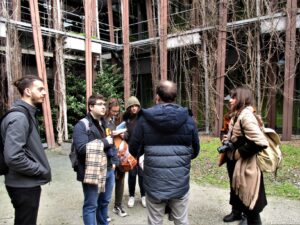 Photo: Institute for Physics of the Humboldt-University
Photo: Institute for Physics of the Humboldt-University
5. Rainwater-management
We visited different places and buildings in which the rainwater is managed. In general, collecting and using the rainwater does improve the environmental and life quality in urbanized areas. For our task – to improve school buildings in a more climate-friendly sense – the collected rainwater could be used for irrigating the green roofs, planted facades and the green areas in the surroundings of the building. To improve the local climate it is recommended to unseal as much as possible paved and asphalted soil in the surroundings.
The rainwater to be managed is “harvested” from paved areas in the surroundings, to be saved afterwards in containers in the underground before using it. It is recommended to install systems of cleaning before conserving the rainwater, in case it should be contaminated by the pavement,. The most ecological way of cleaning are pools on site planted with reed. In a more elaborated project, rainwater can be used also for flushing toilets, so reducing considerably the consumption of tap water. To put rainwater in such a use seems considerably important in regions suffering from lack of water and expecting severe water crisis.
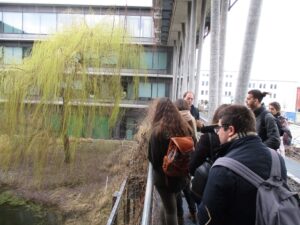 Rainwater “harvest” in a basin (bottom left on the picture). Photo S.Stragies
Rainwater “harvest” in a basin (bottom left on the picture). Photo S.Stragies
6. Using Straw to insulate Buildings
The rural regions of Greece and Spain are characterized by century-old, elaborated traditions to build houses using regionally available natural materials. Therefore, we have included construction with straw and clay in our work program. We just discussed the use of these materials for the thermal insulation of buildings. In the current season it wasn’t possible to visit a house project at work, so we limited the learning unit to a model house already accomplished.
Using pressed straw bales is a convincing and feasible method of thermal insulation. To guarantee stability, it is recommended to tie the bales into a wooden stand construction. The straw bales are preferably plastered with loam, alternatively with lime, whereby the time sequence should be short in order to prevent the penetration of mould-forming fungi, for example. In Germany, a wall insulated with straw made in this way is accepted by the existing regulations for fire protection. A wall made of straw bales and covered by clay is slightly more secured against fire accidents than thermal insulation with polystyrene.
Other advantages of straw insulation are its health quality, the low energy input in production, environmentally friendly waste disposal and regional availability, especially through grain cultivation.
To build and to insulate with straw as well as with clay are convincing and, paradoxically, at present innovative in regions with similar popular traditions in constructing houses. Alternative regional products for thermal insulation could be other regional resources for the insulation of buildings, for example reed, sheep-wool, cork from the forests and shells from the sea-side.
7. Solarcity Berlin
An employee of Berlin Department for Energy presented and explained the “Master plan Solar City Berlin“, decided on just some days before (10th March) by the regional government of Berlin.
Starting point of the master plan is an analysis of the solar potential of the roof areas throughout the city: they can provide about 25% of Berlin’s current electricity needs at present. The target of Berlin is to cover 2050 100% Berlin’s electricity completely (100%) by sun, wind and biomass. So, the city has to
-
make use of the corresponding solar potential as soon as possible
-
unlock the solar potential on public buildings
-
support private building owners by the installation of solar systems
-
Since Berlin is actively involved in climate adaptation, the installation of photovoltaic systems should be combined, as far as possible, with the plantation of green roofs. (Even more strongly recommended in cities of Southern Europe with its more densely urbanization and higher summer temperatures).
The master plan was elaborated in expert meetings, workshops on specific topics and public events, in which NGOs and engaged persons in the city participated. A result of the expert group was a catalogue of 27 measures in 9 fields of action to attain the solar-city-targets as soon and efficient as possible.
Of particular interest to us was the transferability of the concept to urban centres in Southern Europe. To become a “Solar City”, it seems to be most effective to start with the building stock in public ownership and with buildings of private companies. For blocks of flats with owners’ associations, frequent in Spanish and Greek cities, and for houses with private owners, we plea either to lease the roof areas to solar companies or to offer energy contracting between companies or cooperatives and the owners.
In any case, the city needs central players and driving forces like the public enterprise “Stadtwerke Klima” in Berlin. Just in January 2020, the city of Cádiz has started a promising initiative: together with the municipal electricity company there will be offered help and advisoring to enterprises, administrations and private owners to put photovoltaic on the roof, selling the yield to the company or using the yield for prosuming (production and consumtion). The advisoring will include the planning, installation, clarification of legal issues and all necessary administrative steps. Due to the much stronger solar radiation in Cádiz, 1.8 times more than in Berlin, and now favourable regulations for solar prosuming and the neighbourly networking of solar power, the prospects in Cádiz are more promising than in Berlin: The Cádiz-target is to cover 27% of the city’s electricity requirements with photovoltaic power by 2030.
7. Solar Centre Berlin
The lecture on Solar City Berlin was combined with a visit of the Solar Centre Berlin, founded by the “German Association for Solar Energy (DGS)” and financed by the Berlin government. Main tasks of the Solar Center Berlin are:
-
Consultation on solar energy including on-site visits and assistance in the evaluation of offers.
-
Information services for craft companies, architects and engineers.
-
Presentation of best practice examples.
-
Trainings and qualification programs.
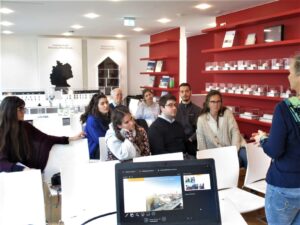 Our group in the Solar Centre Berlin. Photo S.Stragies
Our group in the Solar Centre Berlin. Photo S.Stragies
9. Heating with Renewable Energy: in the building complex of the housing company “Märkische Scholle” in Berlin
The cooperative is managing a building complex with 841 flats, constructed 85 years ago. Lately all buildings were refurbished by thermal insulation, equipped with a new heating system that combines thermosolar, heat storage in the earth, the heat recovery from waste air and photovoltaic.
We visited the heating system. Its central part is a low-temperature heating system that operates using two electric heat pumps. Their power supply is mainly provided by photovoltaic modules. The energy for heating is obtained from three sources (solar thermal, ventilation systems with heat recovery, geothermal heat). Outside of the building there are areas in underground and insulated to the environment serving as storages for the overshoot heat of the thermosolar panels used in the cold season The interplay between heat supply and storage is automatically controlled by a dynamic energy manager.
The aim was to make the building, and thus each individual apartment, completely self-sufficient in renewable energy through the coordinated use of solar and geothermal energy, exhaust air heat and heat recovery. Up to now, the aim is reached by 80%. Holding into account the reduction of energy demand by the thermal insulation, the use of fossil energies is reduced by about 90%. The rental fee for the tenants grew only moderately, because of the reduction of energy costs necessary for the flats.
Can the experiences from the 841-apartment project in Berlin be transferred to southern European conditions? In a winter normally far milder, it seems possible to provide the heat supply completely by combining thermosolar panels, geothermal storage, photovoltaic and the use of exhaust air heat. The resulting costs for tenants and owners, which are considered moderate by the company in Berlin, should have to be checked on site.
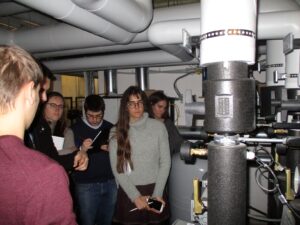 In a control center in the basement of the building complex. Photo S. Stragies
In a control center in the basement of the building complex. Photo S. Stragies
Because of the premature return to their homes the teams were not able to visit four projects which were planned in the course.
10. Innovative Energy Engineering in a new Building
We had planned a guided visit of the energy system and management of the building of the daily newspaper “taz”, just finished end 2018. For the targets of our project, the system of cooling is particularly interesting:
The building prevents the interior from overheating through efficient insulation and effective sun protection on the facades. The thermal storage capacity of the building material has positive effects too: it warms up more slowly and absorbs the coolness of the night. Recirculating air technology with climate convectors is used for the interiors. An “adiabatic” system on the roof with evaporative ventilation is lowering the temperature of the water using normal tap water. (A preferred solution, the use and the evaporation of rainwater, could not be realized because of an incomprehensible veto of the waters works in Berlin). The water with a lower temperature is transferred by pipe-system in the interior of the building. In the first summer 2019, just at a time of exceptional heat (in Berlin near 40 degrees) the cooling system, was sufficient to keep a maximum temperature of 26 degrees Celsius inside the buildings: The inner climate was felt as agreeable, compared with the heat the users suffered outside the building.
In the cold season, the pipe system is used to heat the rooms; the heating capacity will be taken from the server centre of the newspaper and from the restaurant and the kitchen area. (The additional heating on frosty days is provided by a district heating system to which the building is connected).
In the taz building, a ventilation system with energy-saving climate convectors is used. The staircase also serves as an exhaust air conduct. The exhaust air is led to the convectors where it is cooled and recirculated together with the outside air.
11. Energy Management in the Free University (FU) of Berlin
At the FU Berlin, – with 11 departments, 32.500 students and about 500 professors – there exists since 2002 a “Unit for Sustainability and Energy Management”. Its results, put into numbers, are promising:
-
-
reduction in energy consumption 2001- 2011: -26%
-
reduction in heating oil: -99%
-
reduction in heat consumption (without increase): -35%
-
reduction in CO2-emissions without increase in floor space: -36%
-
reduction in CO2-emissions in electricity (own PV-capacity: 675 kW plus contracts of deliverance from green energy companies): -81 %
-
avoided costs due to the reduction of energy consumption: 4.2 million €
-
aggregate avoided costs since 2003: 42.7 million €
-
accumulated costs for investments to reduce energy use: 20.2 million €
Decisive to reach these goals were amongst other things:
-
A permanent working staff for energy management in the unit.
-
Voluntary environmental teams (employees, students, professors) in the departments and buildings, being occupied with the “every day energy management” and other themes of environmental relevance in the work places and surroundings.
-
Introduction of a “bonus system” in energy reduction: starting from accorded baseline adjustments per year, each department receives an increase in their yearly budget, amounting to 50% of the value gained by energy reduction (temperature adjusted); vice versa the budget will be reduced in the same proportion.
-
Introduction of a green IT-programme to overview and control the energy consumption in all departments of the FU.
12. A reform school as an example…
…how to combine an ambitious energetic renovation with a particular organization of learning and the involvement of the pupils in energy saving activities
13. A nursery school
Cooling of the rooms exclusively by a system of natural ventilation, without using any external energy
Overview of the Learning Units
Learning unit possible application (example)
|
The European Green Deal.
|
To reach the targets which are relatively ambitious, the member states have to start concrete activities, oriented towards their National Energy and Climate Plans (NECP).
To realize these activities, they need hundreds of thousands of qualified, mainly young people.
|
|
Emergency of Climate Crisis
Because of the highly dangerous tipping points in the process of global warming, it is irrefutably urgent to start immediately with ambitious projects to reduce the emissions of greenhouse gases quickly!
|
|
|
How to find a way to achieve Energy Autonomy in a whole region.
An example of a German region with about 103.000 inhabitants and 991 km².
Presented by a film
|
To develop a masterplan for a Greek or Andalusian region for how to reach Energy Autonomy (a highly interesting but very ambitious project)
|
|
Green roofs in buildings, together with solar panels. Thus you can combine an -although limited – form of insulation of the roof with climate adaptation (better local climate) and the use of renewable energy
|
To elaborate such a proposal for new or for existing buildings in your region.
Managing drought by using extended clay or volcanic material to conserve rainwater and plants resisting dryness in your region.
Proof stability of roof.
|
|
To build and to insulate with straw, with different advantages: good insulation-factor and sanitary conditions; product from the regional economy; no energy wasting in the preparation of the material
|
A model project in a rural environment
|
|
Rainwater management,
to save water, in using it for toilets and/or irrigation combined with a greening of the environment of the building, for a better local climate
|
|
|
Plants on or before the walls of buildings, with shadowing effects in summertime and climate adaptation
|
|
|
Heating Supply for the apartments (and for warm water) in a complex of buildings,
by combining thermosolar panels, storage of the solar heat in the earth and use of waste heat from the ventilation of the buildings.
In the Berlin-example between 60 – 100% can be provided.
|
For applying this in buildings there must be already heating pipes.
Therefore: application in Southern European regions seems to be possible only when building new edifices
|
|
The masterplan for a Solar City Berlin.
In particular are instructive
1. the manner of outworking the plan by a staff of experts, together with participation of citizens in public events
2. The definition of different fields of action (in Berlin 9: look the pdf-presentation page 22ff), to realize the solar potential of an urban area
|
A project could be: to elaborate a masterplan “solar …” for a particular complex of buildings in a town or city
|
|
The recently founded Solar Centre in Berlin
|
The foundation of a solar centre in an urban area, financed by public funds and for example with the following tasks:
– Consultation on solar energy including on-site visits and assistance in the evaluation of offers.
– Information services for craft companies,
architects and engineers.
– Presentation of best practice examples.
– Trainings and qualification programs.
|
|
Learning units which had to be cancelled:
|
|
|
The new building of the national newspaper taz:
Heating and cooling is provided by:
-
an adiabatic system
-
the use of energy produced by the digital centre and the restaurant in the building
-
natural techniques in the ventilation of the building
-
green roof and solar panels
|
|
|
A reform (“Montessori”) school: A particular interesting example of energetic renovation; combined with energy saving activities of the pupils in the school
|
|
|
An outstanding example for a strategy of energy saving and energy efficiency in the “Free University of Berlin”, profitable economically as well
|
|
|
Cooling only by natural ventilation, without using any energy.
The example of a nursery school and of buildings projects in Southern Europe
|
|

 Employment & Social Inclusion
Employment & Social Inclusion  Entrepreneurship
Entrepreneurship  Sustainable Growth
Sustainable Growth
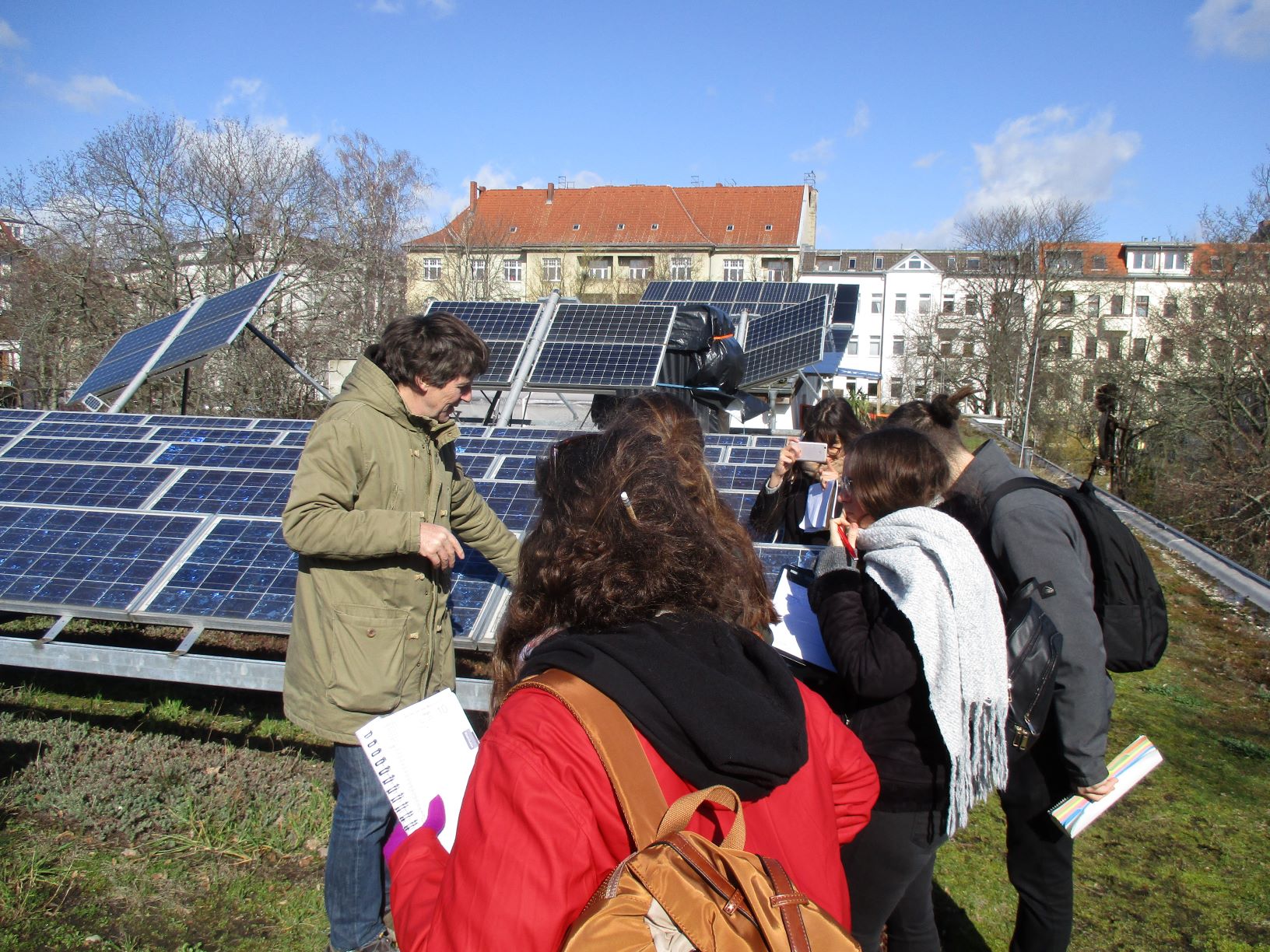
 The study-group in Berlin. Photo S. Stragies
The study-group in Berlin. Photo S. Stragies On a green roof of UFA-Fabrik with solar panels moved by the sun. Photos H. Berger
On a green roof of UFA-Fabrik with solar panels moved by the sun. Photos H. Berger Photo:
Photo:  Rainwater “harvest” in a basin (bottom left on the picture). Photo S.Stragies
Rainwater “harvest” in a basin (bottom left on the picture). Photo S.Stragies Our group in the Solar Centre Berlin. Photo S.Stragies
Our group in the Solar Centre Berlin. Photo S.Stragies
Recent Comments